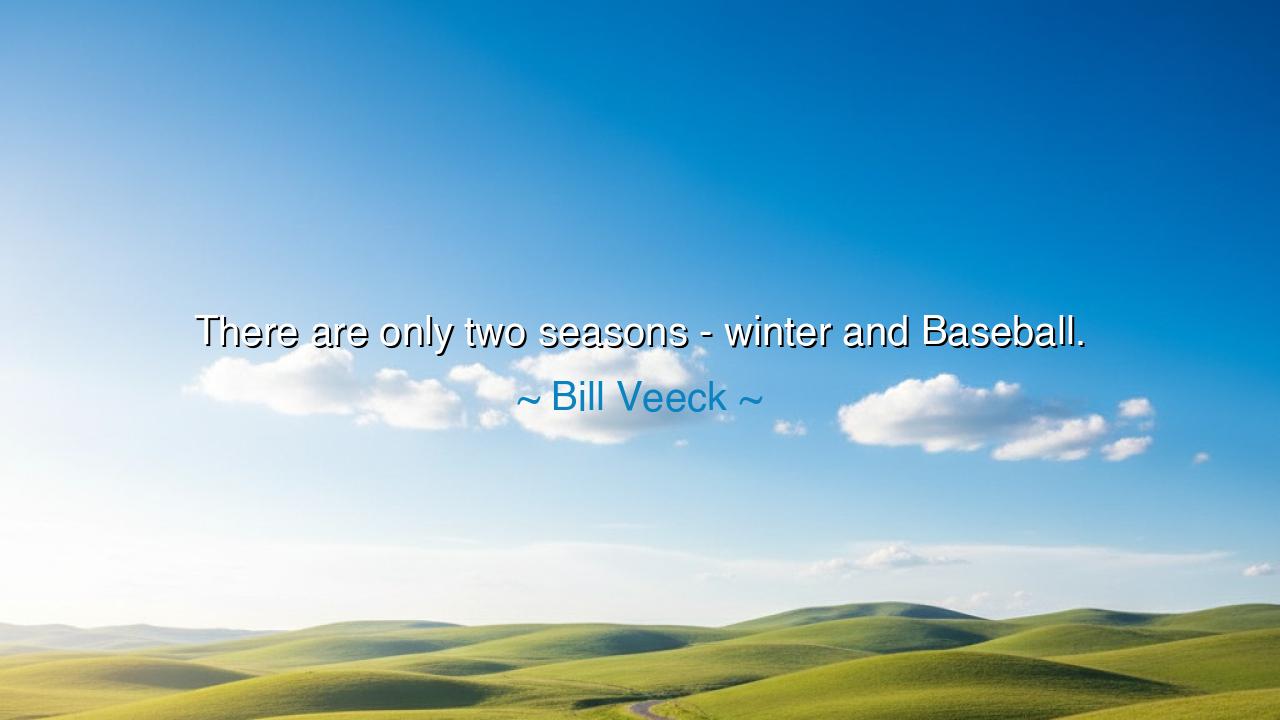
There are only two seasons - winter and Baseball.






In the great tapestry of American life, where the crack of the bat has long been woven into the heartbeat of summer, the voice of Bill Veeck, visionary and showman of the game, rings with both humor and devotion. He declared: “There are only two seasons – winter and Baseball.” Though it may seem a playful exaggeration, within it lies a profound truth about passion, belonging, and the rhythm of life itself.
For to those who love baseball, time itself bends to the game’s presence. When the season begins, the days are alive—stadiums filled, radios humming, hearts tethered to the score. The summer sun seems brighter, the evenings richer, because the game is with us. And when the season ends, the world falls into silence and coldness. The long stretch of winter is not merely the absence of warmth, but the absence of the game, a void where fans wait, longing for the spring that brings baseball back. Thus Veeck names only two true seasons: the one of joy and the one of longing.
The ancients also understood such rhythms. Consider the Greek festivals of Dionysus, where theater and music were not mere entertainment but the heartbeat of the city. The people divided their year not simply by the calendar, but by the presence or absence of the sacred art. So too do lovers of baseball measure life not in months, but in innings and standings, in the span between Opening Day and the final out of autumn. Baseball is not a pastime; it is a calendar of the heart.
And yet, Veeck’s words also carry a deeper wisdom. For they remind us of the power of devotion—how a single passion can transform the ordinary flow of time into something sacred. When one gives themselves fully to a pursuit—whether it be baseball, art, love, or labor—the world is divided into two: the time when that passion lives, and the time when it is absent. This is both blessing and burden, for passion enlivens the soul, but its absence leaves an aching void.
History offers us a vivid story in the life of the Brooklyn Dodgers and their faithful fans. For generations, they lived with their team as the center of their summers, filling Ebbets Field with devotion. When the Dodgers left Brooklyn for Los Angeles, it was as though winter fell forever upon those who loved them. Old men wept, children lost their heroes, and an entire borough felt the absence not just of a team but of the heartbeat of their lives. Here we see the truth of Veeck’s words: baseball is more than a game, it is a season of the soul.
The lesson for us is clear: discover what divides your life into seasons of joy and seasons of waiting. For some, it may be baseball; for others, it may be music, faith, family, or craft. Whatever it is, give yourself to it fully. Let it shape your days, let it give meaning to time itself. And when the season of absence comes, endure with patience, holding fast to hope until it returns.
So let Bill Veeck’s words be passed down as more than jest: “There are only two seasons – winter and Baseball.” Learn from them the value of passion, the rhythm of devotion, the way love for something greater than oneself can transform the turning of the year. Find your baseball—your craft, your calling, your joy—and live by it, so that your days are not measured by the clock, but by the fire of what you love. For in the end, the seasons of the soul are the only seasons that truly matter.






AAdministratorAdministrator
Welcome, honored guests. Please leave a comment, we will respond soon